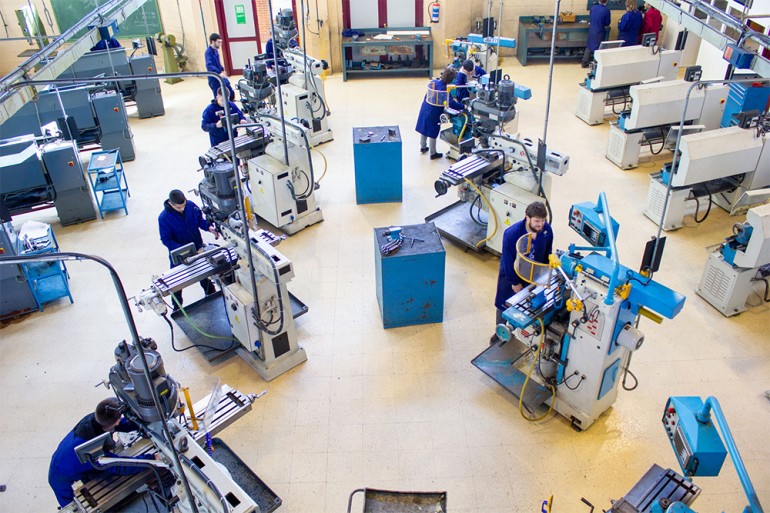The Law on Vocational Training places the company in the teaching of contents to students
- From this course, the students of Vocational Training of Hego Euskal Herria will work from the first year in the companies, the companies themselves will teach and evaluate the contents of the educational curriculum and will reduce the technical and specific knowledge of the students, as denounced by professors Xabier Jiménez and Mikel Bilbao: “From the very beginning, in a company, under their evaluation and with less training to jump, they will turn students into subjects of companies.”

The Professors of Vocational Training Mikel Bilbao Luengas (Navarra) and Xabier Jiménez Baños (Euskadi) have warned ARGIA that the increased involvement of companies in the Spanish Government's Vocational Training Act will leave very worrying consequences and will put the Vocational Training Schools at the service of companies. We have been told about the decline in training, the benefits that companies will reap and the profile of the student-workers who will be linked to companies. This course has begun to apply the law in Hego Euskal Herria.
The law includes the Dual System, in which the school and the company are integrated. And linked to this system, radical change: before, having given all the resume in the school and passed the lessons, the students went to a company, at the end of the degree, to see the dynamics of the company and to study. Now, the students go from the first year to the companies, “when they still do not have enough knowledge and are not required to have all the subjects passed”, and in the company they have to internalize the contents, teach the theoretical contents of the curriculum in the company – the students who previously had an ‘instructor’ in the company, now the representative of the company is called ‘tutor’–. The evaluation will be carried out by the tutor of the company who certifies that the student has acquired in the company the knowledge associated with the modules. At least 20% of the curricular content will be provided by the company (about 400 hours) and if an intensive model is chosen, at least 30% of the contents of the curriculum.
Mikel Bilbao: "On paper the company will put everything OK, the students have learned this and the other, but in practice it is not real, they will not give any content"
“We will all have to lie”
What will be the reality? “On paper the company will put all OK, who have learned this and the other, but in practice it is not real, they will not give any content,” says Bilbao-. To start with, they cannot offer it in a pedagogical way, because when a student puts a cable or an antenna, they evaluate whether they know the elements of the antenna, whether they can obtain parameters, whether they can guide the antenna… and in companies, at most, they put a cable and evaluate that they know how to do it. They can't do anything else, they don't have time or training. It’s yet to be seen if there’s going to be any training for the company’s tutors, but this course will be a joke.” Of the same opinion is Baños: “We will all have to lie in the official documents and the inspection will do as if it did not. In addition, some colleagues are angry because they are directing the teaching work to companies, usurping our work.”
In this sense, the Navarro professor is clear that: “There will come a time when the company says that ‘if I have to give 20% of the knowledge, in exchange for that you give me money (public money)’, and it is logical because they are required a job and a responsibility; it will become another source of income for companies and so we have seen in other countries; they have finished doing workshops in the company itself, focused on the education of students”.
As has been mentioned, unlike what has been done so far, students will go to companies from the first year (some will be 15 years old), still have little knowledge and without good preparation, the two teachers say. “Naturally, the first course is usually a filter, some drop out of school, others don’t exceed many subjects… but that filter is no longer there, all students go to companies,” Jimenez said. “From a very young age they are going to jump into the domestication of companies,” says Bilbao.
Companies win in savage competition between centres
Bilbao has criticized that the law seeks companies for all students, and that competition between centers is worrying, and has considered that the law will strengthen the agreements between concerted centers and companies so that the students of these centers go to the companies. In spite of everything, he says that the teachers have become sellers: “In inter-center competition, we have to go to the companies to sell the kids so they can work in those companies, so we are fully at the service of those companies; we want them to receive our students, and the companies end up asking for exactly what they want, what the students/workers need, what they want them to be taught in the center.” The concern of the faculty about the progressive incorporation of the Vocational Training centers is that: “We will listen to you, and it is very serious, because we will give you the power to decide on the educational curriculum.”
To better understand the students and especially the staff that will leave the Professional Training, the professors have highlighted three changes that are related to each other: the reduction of technical studies, the prevalence of competencies on knowledge, and the newly created Competency Card.
On the one hand, our partners have denounced that technical content will have fewer hours (in theory, they will be provided in companies). In addition, Jiménez explained that until recently there were two teams of Vocational Training teachers: Secondary School Teachers (university graduates, e.g. engineers to deliver theoretical content) and technical teachers (vocational training graduates to deliver practical modules). “Now they have finished with the technical professors, you can no longer enter the list of professors with a VET degree and those who are left in a vulnerable situation. Education officials believe it is more appropriate to teach how to fix cars than an engineer who has just finished the career, than a mechanic who has worked for ten years in a garage.”
Xabier Jiménez: "Education officials believe that the engineer who has just completed the course is more suitable for teaching to repair cars than the mechanic who has worked in a garage for ten years."
Knowledge vs. competencies
On the other hand, the lectures have referred to the competencies that in recent years have gained weight in education in general and have strongly invaded Vocational Training. They pointed out that competences such as flexibility, the need to continue training throughout life, entrepreneurship, dynamism, the ability to adapt and adapt to the pace and activity of the company… respond well to the wishes of the companies. In addition to the praise of the competences, the Information Society extends the secondary nature of the knowledge: “Knowledge is undervalued, memorization is rejected and highly accurate knowledge is neglected, arguing that it is easy to search,” says Bilbao. However, with a knowledge you can follow the path of obtaining new knowledge, but if you only have skills and have no knowledge, without foundation you will not be able to access new knowledge.” As far as Vocational Training is concerned, the professor has given us an example: “If I’m an electrician and I know low-voltage regulation, I master all kinds of circuits and I know how to fix breakdowns, as a worker I will be freer, but I can only put four cables, more dependent on the boss. We have been sold that competencies give us the ability to adapt, but the ability to adapt gives us the knowledge.”
For Bilbao, this model of competencies strengthens another of the novelties of the law: Competence Card. Before, the student studied a degree and got the title; now, as he learns some subjects, he is recognized some competencies with which he/she can work, at the same time that new subjects and competencies can be incorporated throughout life. “It may seem interesting, but it breaks the labor agreements, it breaks the schools and professional families because it individualizes the worker: with three subjects from here and two from there you go to the company and what category of work do they give you? When it comes to fighting, which guild do you belong to?”
Mikel Bilbao: "We teachers have to go to companies to sell to young people so they can work in those companies; in the end, we will give them the power to decide on the educational resume themselves."
Result: Business dependency
Jiménez and Bilbao clearly see the conclusion of all the above: “For two years in a company, so young, and learning its dynamics and forms, it will make you your subject, with less knowledge and possibilities of jumping to other areas or positions, and in many cases with the feeling that you owe something to the company, that if you leave there you will fail.” The hardest hit will be the most vulnerable students, who are in the worst socioeconomic situation, and the law is expected to only increase the gap between students.
As for knowledge, Mikel Bilbao brought to the tertulia “the mantra we hear from entrepreneurs”: “They say they want a high-skilled workforce, but it is not.” However, their data confirm that they have none, that there is no demand for more qualified personnel. On the contrary, he stressed that there is a demand for low-skilled workers: “We are seeing across Europe that the technification and automation of the production chain is more damaging to people with medium qualifications and, therefore, end up in less skilled jobs than those they have, in more precarious conditions.”
Professors Mikel Bilbao Luengas and Xabier Jiménez Baños have drawn a black panorama in view of the fear that the prestigious Vocational Training sold in the Basque Country will prioritize the interests of companies and turn students into peones of the future.
Ikasle Abertzaleek greba deitu dute hezkuntzan, ostegun honetarako. Indarrean diren hezkuntza erreforma eta legeek sakoneko arazoak indartu baino ez dituztela egiten eta hezkuntzak soluzio integrala behar duela aldarrikatzen dute: “Hezkuntza sistema sozialista eraikitzea... [+]
The CAPV Department of Education does not intend to promote Euskera in professional training, nor does it intend to do so: it wants to leave Euskera as it is, because it wants to promote Euskera in the socioeconomic sphere with the staff who do not know Euskera.
The penance of... [+]
Covid-19ak eragindako krisi ekonomiko, laboral eta sozialak agerian utzi ditu milaka negozio txiki, berriz irekitzeko aukerarik gabe ateak ixten ari direnak; dozenaka mila lanpostu galdu dira horrela.
This is what the Department of Education has told us that Son Martin cannot complete the higher education cycle he has chosen.
Ezkaintza Deleted.
I was not surprised that there were no Model D places at the largest vocational training institute in Álava. He couldn't be... [+]
























